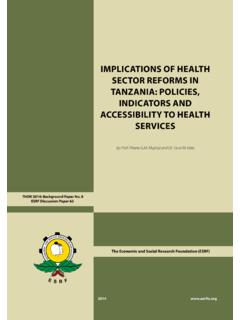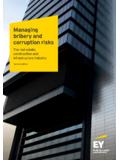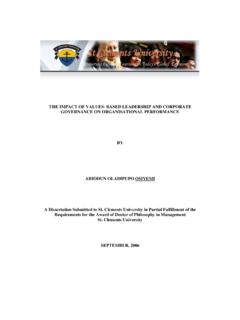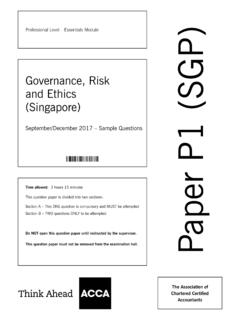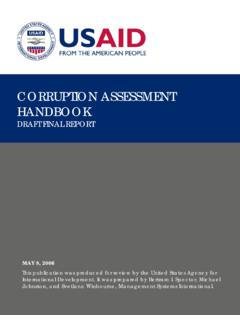Transcription of 3.0 GOVERNANCE IN TANZAN - Economic and …
1 Ii GOVERNANCE IN MINING AREAS IN TANZANIA WITH SPECIAL REFERENCE TO LAND ISSUES By Dr. Furaha Lugoe ESRF Discussion Paper No. 41 PUBLISHED BY: The Economic and Social Research Foundation (ESRF) 51 Uporoto Street (Off Ali Hassan Mwinyi Road), Ursino Estate Box 31226 Dar es Salaam, Tanzania. Tel: (+255) 22 2760260, 2760751/52 Mobile: (+255) 754 280133 Fax: (+255) 22 2760062 Email: Website: ISBN 978-9987-610-71-6 2012 Economic and Social Research Foundation iii TABLE OF CONTENTS ABSTRACT .. IV INTRODUCTION AND BACKGROUND .. 1 GOVERNANCE PREVIEW .. 1 IMPROVING ON GOVERNANCE .
2 2 TENETS OF GOOD GOVERNANCE .. 3 WHY DOES TANZANIA NEED GOOD GOVERNANCE ? .. 3 GOVERNANCE IN TANZANIA S MINING INDUSTRY .. 3 REGULATORY FRAMEWORK FOR THE MINING SECTOR: .. 5 CONFLICTS BETWEEN RIGHTS HOLDERS .. 6 PUBLIC DISCONTENT OVER CONTRACTS .. 8 COST OF DOING BUSINESS AND CORRUPTION .. 9 THE CHAOTIC NATURE OF ASM .. 10 CONCLUSIONS AND RECOMMENDATIONS .. 10 REFERENCES .. 12 iv ABSTRACT The economies of many countries such as the Gulf and Southern African States are to a considerable extent sustained by financial flows from extraction of mineral resources and fossil fuels.
3 The discovery of such fortunes, in sufficiently viable quantities, can be a significant national blessing for effectively addressing development challenges. However, experience in other countries has shown that financial resources obtainable from mineral and fossil fuel extraction the Extractive Industry, have not always assisted Economic and social development. On the contrary, they have adversely affected political and hence socio- Economic stability in some countries. This paper examines the situation with gold mining in Tanzania. It notes that gold mining has had its ups and downs due to GOVERNANCE related issues.
4 The paper asserts that policies and mind sets of the post independence era severely constrained investment in mineral exploration and extraction, resulting in the closure of existing mines without new openings for over 20 years. The paper also highlights the reality that a paradigm shift in favour of Economic recovery and investment promotion has taken place, with artisanal and small miners (ASM) rejuvenating the mining of gold and Tanzanite in the 1980s and being joined by large scale miners (LSM) since 1998. The ugly experience of mining worldwide and on the continent has also been reflected in Tanzania.
5 Significant disputes and conflicts have surfaced among mining industry stakeholders consisting of ASM, LSM, host communities and community based organizations, as well as local and central government authorities. The review of this paper includes an argument that the conflicts experienced in the mining industry in Tanzania, which have largely surfaced more acutely with respect to land use, cannot be wholly removed without hurting production. They may be mitigated to the level of stakeholder co-existence, though this may not be that easy due to differing interests of the stakeholders.
6 Nonetheless, an attempt should be made, with the entry point at aligning the various policies and laws, and creating a suitable framework that links all sectors related to mineral exploration and extraction. All stakeholders will be losers if gold production ceases. In the same vein, all are jointly winners if production is made profitable in the common interest of everybody. 1 INTRODUCTION AND BACKGROUND Mining reform in Tanzania is only two decades old. It started in earnest with Economic recovery programmes that freed, in part, the major means of production from monopolistic state ownership, a practice commonly found in many developing countries in the post-independence policy frameworks.
7 The Tanzania reforms were manifested by a new Mining Act that was legislated in 1998. A year later gold production was at an all time high of 388,000 ounces and in the new millennium it has consistently been over 1 million ounces per annum. Minerals now accounts for over 45 percent of the country s export ( Economic Survey 2011) in which gold occupies a major share; and has increased its share of tax revenue ( ) and to GDP ( ). However, commercial mining by the large mining companies has often adversely affected artisanal small miners (ASM) that employ more people than the large scale miners (LSM).
8 There have also been many problems with communities around the mines that remain unresolved to this day. Other challenges include those of human and resources management capacity, infrastructure and regulatory framework. It is against this background that it is seen fit to review the mining industry, amongst other industries, and in context of good GOVERNANCE principles as will be done in this paper. GOVERNANCE PREVIEW GOVERNANCE in extractive industries is a broad term but it is essentially about processes of decision-making who makes the decisions and on what basis and the processes by which decisions are implemented, or not (Lugoe, 2010).
9 In this case, discussion will be centered on this theme of decision making, in the context of extractive industries particularly gold, in Tanzania. While GOVERNANCE includes policies, institutions, processes and power, it is much more about the processes and politics than the actual content of policies and laws. In extractive industries, the processes of exploration and mining rights, the participation of stakeholders in these processes and redress to disputable issues and other forms of conflict will be examined. GOVERNANCE occurs at different administrative levels within Tanzania, and even at global level, and can be associated with different entities ( nations, communities, corporations, households).
10 In the national context, it is not confined to governments, but includes private sector and civil society actors. This paper shall reflect on GOVERNANCE involving several actors at different levels, key ones being people who get displaced by mining rights holders, small scale miners, large scale miners, local government at Village and District levels, Central Government involving policy makers and government operatives, Private Sector Service providers, Civil Society Organizations (CSO) including Community Based Organizations (CBO) and non- Governmental organizations (NGO). The conduct of GOVERNANCE is happening all the time, and is not necessarily prescribed by or confined to formal rules and regulations.


